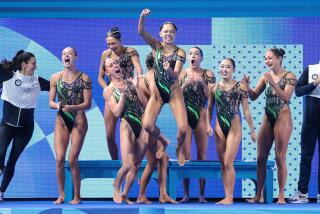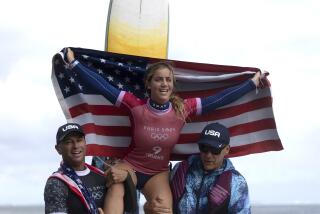LaFace Helps the U.S. Save Face; Cuban Third
- Share via
HAVANA — For at least two divers in the women’s three-meter springboard final Sunday, it was a case of: what they didn’t know didn’t hurt.
Both Karen LaFace of the U.S. and Mayte Garbey of Cuba stood for their final dives not knowing that history, and a nation’s sporting prestige, counted on the outcome.
Things worked out happily for both--LaFace won the gold medal and Garbey the bronze--but both said later they were glad they didn’t know their diving history.
LaFace was unaware of how American women have dominated the event. In fact, the United States has won every women’s springboard competition except one since the Pan American Games began in 1951. Micki King won the silver in 1971, but that was the last time an American woman failed to win the event.
LaFace not knowing this was a good thing, because she didn’t need the extra pressure. The 24-year-old from Ft. Lauderdale was the last diver in the competition and she knew, based on the poor last dive of Mary Alcala of Mexico, that she had a chance to win.
Alcala was leading going into the last round Sunday at the Pan American pool complex, but the usually steady Mexican failed to seal the victory. That opened the door for LaFace, and others.
LaFace had saved her best dive for last, an inward 2 1/2 in tuck position. But the scene was chaotic when LaFace stood on the board for her dive. The Cuban crowd was making so much noise that LaFace couldn’t hear the referee’s whistle, which signals that she is to attempt her dive.
The public-address announcer tried three times to silence the crowd, to no avail. Through all of this, LaFace heard a whistle and she stepped to the end of the board and prepared to dive. The she hesitated and looked down at a Canadian coach who was sitting on the pool deck.
“Was that the whistle?” she asked.
The coach shrugged. Who could tell in that din?
LaFace elected to go to the back of the board and start again. It was a smart decision, for as she waited there, and as the crowd quieted, the referee blew the whistle. The whistle LaFace had heard was blown by someone in the stands.
The dive was her strongest of the day and when the judges’ scores were flashed on the scoreboard, it was the U.S. team’s turn to make some noise.
LaFace said she tried not to let the distractions bother her. The U.S. coaching staff had already warned the team that competing in a building full of partisan supporters was going to be tough.
“We tried to get them into a mindset that they would be the underdogs,” Coach Ron O’Brien said.
Most of the the raucous demonstrations had been positive, being directed toward Cuba’s two divers, Garbey and Omara Lapera. Garbey, 24, was the most sensational, showing great strength but ragged technique. She worked her way up through the 10-dive program and, as did LaFace, she had a chance to medal on her last dive.
What she didn’t know was that Cuba had won only one diving medal in the Pan Am Games, in both men’s and women’s competition. It’s doubtful that many in the crowd knew, either, but with the vigor with which they cheered perhaps they could gain Cuba’s medal themselves. Every time Garbey or Lapera prepared to dive, the crowd was transformed into a rhythm section. Cubans were beating drums, tin cans and wooden blocks while chanting and singing.
Garbey said what divers always say, that she didn’t hear the crowd. Then she said, “I was not expecting a medal, so I was very nervous that I had a chance on my last attempt.”
The nerves didn’t show, as Garbey scored 6s and 7s, and an 8 from the Cuban judge. That was enough to put her in second, behind Paige Gordon of Canada, who had moved to first only two dives before. Three dives later, LaFace beat them both and Gordon won the silver medal.
LaFace, 25, plans to retire after the 1992 Olympic Games and attend medical school. She managed to get through Sunday’s scene with her own mix of poise, intelligence and good humor.
And a dash of ignorance.
More to Read
Go beyond the scoreboard
Get the latest on L.A.'s teams in the daily Sports Report newsletter.
You may occasionally receive promotional content from the Los Angeles Times.







